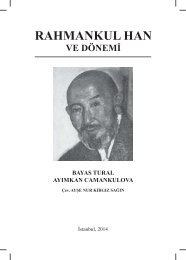THE SOVIET HISTORIOGRAPHY AND THE QUESTION OF KAZAKHSTAN’S HISTORY
SOVYET-TARIH-YAZICILIGI-ENG
SOVYET-TARIH-YAZICILIGI-ENG
Create successful ePaper yourself
Turn your PDF publications into a flip-book with our unique Google optimized e-Paper software.
<strong>THE</strong> <strong>QUESTION</strong> <strong>OF</strong> <strong>KAZAKHSTAN’S</strong> <strong>HISTORY</strong> 135<br />
the “privileged human beings”. It is they who appeal, according to<br />
Toynbee, as saints, mystics, founders of religion, philosophers, generals<br />
and historians. 233<br />
It seems that ‘touching history’ is an apt word for such turning<br />
points with great consequences. The history of Central Asia throughout<br />
the ages is no exception from this point of view.<br />
Kazak society considered Kenesary Khan/Han Kene as a leader<br />
who had many of the above characteristics. Therefore, one of the<br />
decisive years for the very survival of the Kazaks took place during<br />
the nineteenth century under the leadership of Kenesary Khan. It can<br />
be seen in the works of Ermukhan Bekmakhanov, who recorded page<br />
by page in digging into many archives for the history of Khan Kene’s<br />
struggle, which has made public the conflicting interests of the power<br />
centers of the Central Asian Turkic society in general and Kazak people<br />
in particular. It was the struggle of the Kazaks against the colonial<br />
Russian over-lordship as well as societal peculiarities of the people<br />
in the Kazak steppe that resulted with heavy consequences during<br />
and after all those years and decades.<br />
When you read the work of Ermukhan Bekmakhanov about Kenesary<br />
Khan, one can see the legendary and epical struggle of Kenesary and<br />
his brother Navrizbay, grandsons of Abilay Khan, who had united the<br />
Kazak and led decisive battles of survival against the Zhungars in<br />
early eighteenth century; the organizing ability of the two brothers<br />
who brought together the Kazaks living their traditional life-style<br />
since time immemorial and band them together to lead with extraordinary<br />
bravery against the military superiority of the tsarist Russian<br />
imperialist forces; the genetic ability of statesmanship of Kenesary<br />
Khan can also be seen clearly in his diplomatic correspondence with<br />
the colonialist Russian state officials and administration. However,<br />
Kenesary Khan was subjected to a rather supercilious style of the<br />
tsarist imperial behavior of the Russian officials.<br />
During the Soviet period, many historical events were used to serve<br />
the political purpose of the system due to the ideological priority in<br />
writing history. Kazak history writing prior to the revolution was also<br />
subjected to such an operation. The centrally directed history writing<br />
process in Kazakstan also created the so-called “Red Heroes,” and<br />
they were the ones who received much praise. It was later realized<br />
that the works about Kenesary Han Kasymov threatened to display<br />
the misinterpretation of such an exploitative policy.<br />
A new wave of reinterpretation of history emerged during the two<br />
233 Ataov, Turkkaya. “History and Professor Toynbee: A Critique of Western Interpretation,<br />
Turkish Yearbook, Vol.IX (1968), p.7.



